Introduction
Applying for a job in the UK Civil Service can feel daunting, especially when faced with forms that ask for your employment history, previous skills and experience, and a statement of suitability all in one go. If you’re confused by what to write, how to structure it, or even what these sections mean, you’re not alone.
This comprehensive guide breaks down every stage of the civil service application form, from choosing the right examples to structuring your answers with the STAR method. You’ll learn:
- The difference between Employment History and Previous Skills and Experience
- How to avoid repeating yourself across sections
- What recruiters expect from each part of the form
- Common mistakes, and how to avoid them
Whether you’re applying for your first civil service role or preparing for promotion, this guide will walk you through how to complete your application clearly, confidently, and in line with Success Profiles, all fully updated for 2025.
✅ Success Profiles guidance on GOV.UK
Understanding the Civil Service Application Form
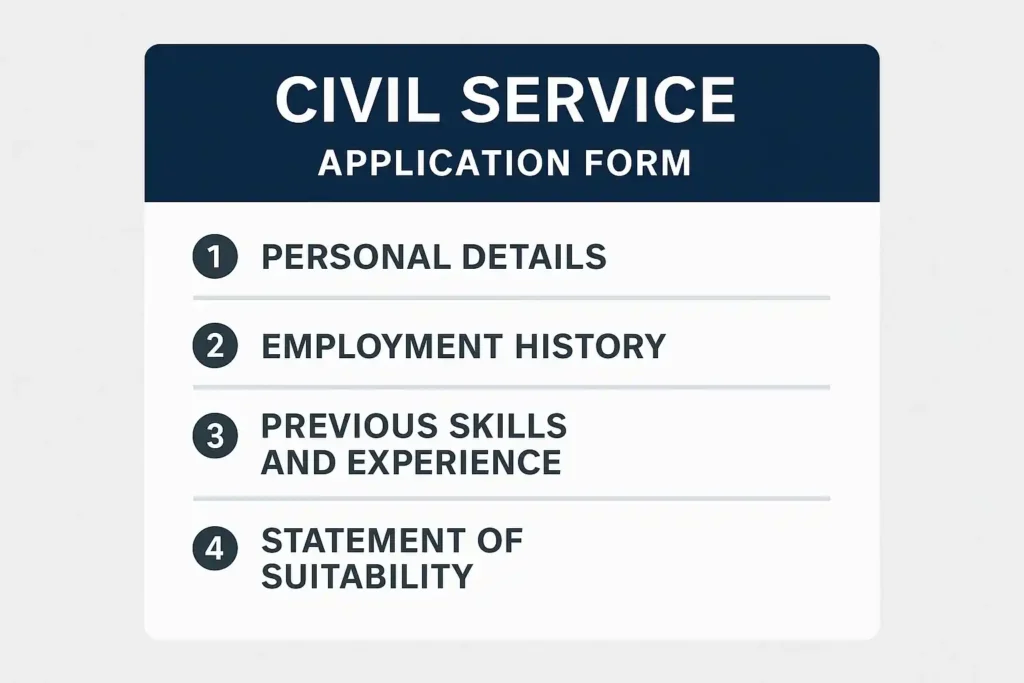
The UK Civil Service uses a centralised and structured recruitment process, meaning most applications follow a standardised format. Whether you’re applying for an Administrative Officer (AO) role or a Senior Executive Officer (SEO) post, you’ll typically complete your application via the official government portal: Civil Service Jobs.
Before you begin, it’s vital to understand the purpose of each section, because each one is scored, and many applicants lose points simply by misunderstanding what’s being asked.
🧾 What Does a Civil Service Application Form Include?
While exact fields can vary slightly depending on department or role, most civil service job applications will ask for:
✅ full guide to writing a Civil Service CV
| Section | Purpose |
|---|---|
| Personal Details | Contact info, right to work in the UK, declarations |
| Employment History | Chronological list of jobs held, including dates and brief duties |
| Previous Skills and Experience | A narrative example showing relevance to the role |
| Statement of Suitability | A longer written statement aligned with behaviours and Success Profiles |
| Supporting Documents (optional) | Upload CV, qualifications, or other attachments depending on role |
🔎 Note: For many roles, only the “Previous Skills and Experience” and “Statement of Suitability” are seen by the hiring panel during blind screening.
📌 Key Terms You’ll See (and What They Mean)
- Employment History: Your job record, positions held, when and where
- Previous Skills and Experience: A written example showing you have the right experience for the job
- Success Profiles: A framework used to assess your fit for the role (includes behaviours, strengths, experience, and abilities)
- STAR: The method you’ll use to structure examples: Situation, Task, Action, Result
✅ Tip:
Before writing anything, download the job description and highlight every behaviour or strength listed. This will help you tailor your answers to exactly what the hiring panel is looking for.
What Is the ‘Employment History’ Section?
The Employment History section of a civil service job application is where you list the jobs you’ve held in the past. It might sound simple, but this section can cause confusion, especially when people wonder how much detail is expected or whether they should use the STAR method here (spoiler: don’t).
This section is about facts, not storytelling. Think of it as a timeline; it gives recruiters a sense of your career path, continuity, and relevance.
🧾 What to Include in Employment History
For each role, include:
- Job Title
- Employer Name
- Start and End Dates (month/year format)
- Brief Summary of Duties or Responsibilities
You do not need to go into lengthy detail or include outcomes; you’ll do that later in the “Previous Skills and Experience” or “Statement of Suitability” sections.
📌 Example Entry
Project Support Officer
Department for Education — June 2021 to Present
Coordinated meeting schedules, managed project documentation, and supported internal reporting on programme delivery timelines.
✅ Best Practices
- Use reverse chronological order; most recent job first
- If unemployed, explain gaps honestly and briefly (e.g. “Career break – July 2022 to March 2023”)
- Keep language neutral and professional
- Aim for 2–4 lines per job unless it’s extremely relevant
⚠️ Common Mistakes to Avoid
| Mistake | Better Approach |
|---|---|
| Writing paragraphs of detail | Keep it short — 3–4 lines max |
| Repeating STAR-style answers here | Save those for later |
| Skipping gaps in employment | Explain honestly if relevant |
| Using first-person language | Keep it objective and consistent |
What Is the ‘Previous Skills and Experience’ Section?
The Previous Skills and Experience section is where you’re expected to provide a short written example that clearly demonstrates why you’re a good fit for the role. Think of this section as a mini case study, a specific scenario where you applied relevant skills, behaviours, and strengths.
Unlike the Employment History section (which is factual and chronological), this section is where you start telling your story using the STAR method, a structured way to describe your experience:
Situation, Task, Action, Result.
🎯 What Should You Write Here?
- A single example from your experience that matches the job’s main behaviours and skills
- Evidence that proves you’ve handled similar responsibilities
- Specific results or outcomes (ideally with numbers or feedback)
✍️ Example (250 words)
In my previous role at the local council, I was responsible for improving service delivery in adult social care. (Situation) I was asked to identify inefficiencies in the referral process. (Task) I led a three-month review involving frontline staff, created a digital tracking system, and trained 20 team members on its use. (Action) This resulted in a 30% reduction in response time and improved feedback scores from service users. (Result)
📌 Formatting Guidelines
| Element | Recommendation |
|---|---|
| Length | Usually 250–300 words (check job ad for limits) |
| Tone | Formal but direct; avoid “I feel” or “I believe” |
| Structure | Use the STAR method |
| Customisation | Tailor it to match behaviours in the advert |
| Reusability | Can be reused across similar roles, with edits |
✅ Tips to Maximise Impact
- Read the job description carefully, match your example to the listed behaviours
- Pick a single, strong scenario, don’t try to cram in multiple stories
- Use metrics or feedback to show success (e.g. “increased efficiency by 20%”)
- Avoid vague traits like “I’m reliable”; show it instead
Employment History vs Previous Skills and Experience: What’s the Difference?
These two sections on the civil service application form often confuse applicants, and with good reason. They may seem similar, but they serve very different purposes and are assessed in very different ways.
🧭 Quick Summary:
| Section | Purpose | Content | Scored? | Format |
|---|---|---|---|---|
| Employment History | Provides a factual overview of your work experience | Job titles, dates, and responsibilities | Usually not scored | Bullet points or short text |
| Previous Skills and Experience | Demonstrates how your experience fits the role | A structured, evidence-based written example | Scored | STAR method narrative |
💬 In Plain English:
- Employment History = “Where have you worked and what did you do?”
- Previous Skills and Experience = “Show me a specific time when you used the right skills for this job.”
They might overlap in terms of content, but their purpose, structure, and impact are entirely different. That’s why it’s a mistake to copy and paste the same information into both sections.
📌 How to Avoid Repetition
Use Employment History to outline your role, and Previous Skills and Experience to bring one of those roles to life.
✅ Example Pairing:
Employment History Entry
Housing Support Officer – Camden Council (June 2020 – Present)
Managed caseload of vulnerable tenants, coordinated access to services, and liaised with external partners.
Previous Skills and Experience Entry (from same role)
Led a new tenancy sustainment programme for high-risk tenants. Designed a contact tracking system, reduced evictions by 18%, and received positive internal feedback.
⚠️ Common Pitfall:
Don’t write STAR examples in the Employment History section. They won’t be assessed there, and you risk missing out on vital marks in the section that actually counts.
How to Structure STAR Examples in the Skills Section
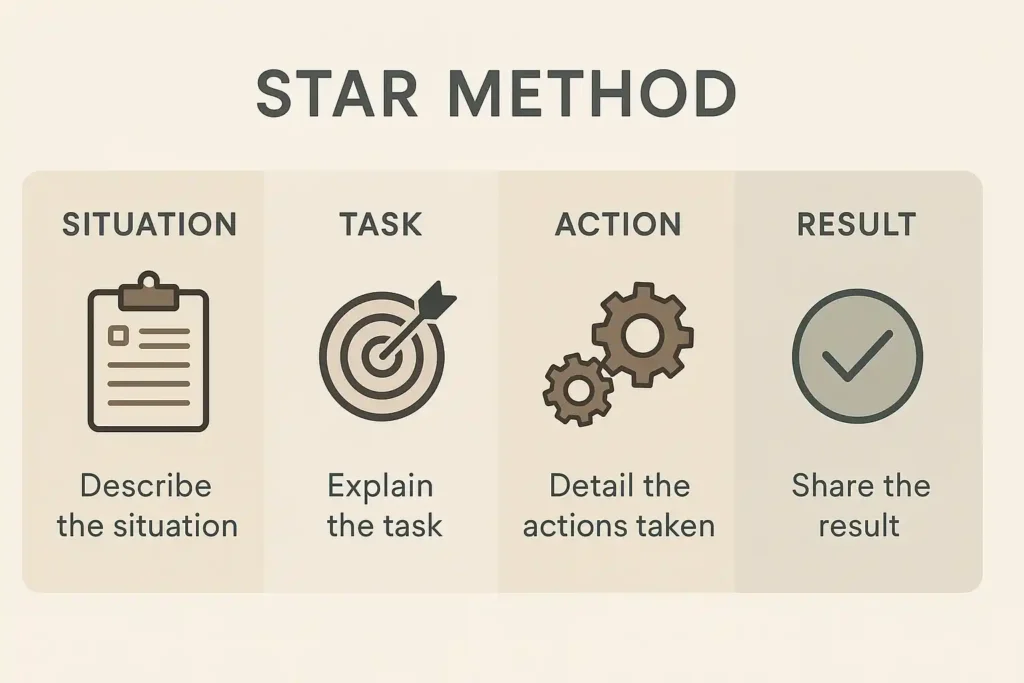
The STAR method is the Civil Service’s gold standard for evaluating written and interview-based answers. If your “Previous Skills and Experience” section doesn’t follow this structure, or at least align with it, you’re likely to score lower, even if your content is relevant.
Let’s break down how to use the STAR method properly when writing this part of your application.
⭐ What Does STAR Stand For?
| Letter | What it Means | What You Should Include |
|---|---|---|
| S | Situation | Briefly explain the context, where and when it happened |
| T | Task | Describe the challenge or responsibility you were given |
| A | Action | What you did to complete the task; this is the main body of your example |
| R | Result | Explain the outcome; what you achieved and how it was measured |
📝 Example of a Strong STAR Response
S: While working as a Case Manager for a housing charity in 2022, I noticed a recurring issue with missed rent payments due to unclear communication.
T: I was asked to design a process to reduce payment delays and improve tenant understanding of rent responsibilities.
A: I consulted with service users and finance staff, rewrote all payment letters in plain English, and introduced automated SMS reminders. I also trained five support workers on how to explain rent procedures clearly.
R: As a result, late payments dropped by 42% within three months, and tenant satisfaction scores in quarterly surveys improved by 15%.
🧠 Tips for Crafting Effective STAR Examples
- Start with the job description: Choose an example that reflects the role’s required behaviours
- Use one specific example; don’t combine multiple scenarios
- Focus on your actions, even if you worked in a team
- Use numbers, feedback, or impact statements to strengthen your result
⚠️ Common Mistakes to Avoid
| Mistake | Fix It By… |
|---|---|
| Writing too much about the team | Focus on your individual contribution |
| Vague results (“It went well…”) | Use measurable outcomes (“Reduced wait time by 30%”) |
| Skipping the ‘R’ step entirely | Always show what changed because of your action |
| Too much background (Situation overload) | Keep S and T brief; spend most words on Action and Result |
📌 Word Count Tip:
Most “Previous Skills and Experience” sections are limited to 250–300 words. Write a concise STAR response and trim any unnecessary details.
Formatting Tips for Your Civil Service Job Application
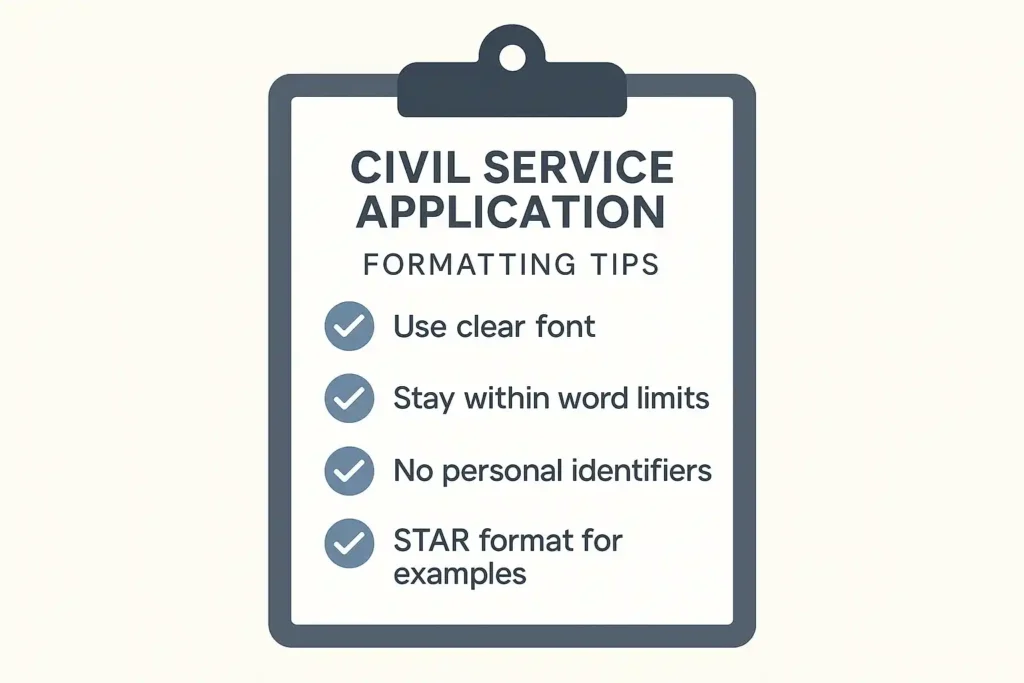
Even the strongest STAR example or employment history can fall flat if it’s poorly formatted. Civil service recruitment is structured, fair, and often scored by panel reviewers, which means clarity, consistency, and professionalism matter as much as content.
Below are practical tips to ensure your form is easy to read, accessible, and compliant with civil service expectations in 2025.
✅ General Formatting Guidelines
| Element | Best Practice |
|---|---|
| Font and Style | Use a standard font (e.g. Arial, Calibri) in black, 11pt — no colours or styles |
| Line Breaks | Break up long paragraphs — aim for no more than 3–4 lines per paragraph |
| Length | Stick to word counts listed (e.g. 250 or 300 words) — don’t exceed them |
| Bullets | Avoid bullet points in STAR examples — write as concise paragraphs |
| Spacing | Use single or 1.15 line spacing for readability |
| Capitalisation | Avoid overusing CAPS — use proper sentence case and punctuation throughout |
📂 File Upload Tips (If Required)
Some roles allow or require uploads (e.g. CVs or statements of suitability). Follow these guidelines:
- Save files in Word (.doc/.docx) format; avoid PDF unless explicitly accepted
- Don’t use tables, text boxes, or headers/footers; these may not be parsed correctly
- File names should be clear and anonymous:
policy_officer_application_2025_BHCVW.docx(no personal names)
🔐 Accessibility and Anonymity
- Remove your name, email, and contact info from all document bodies (include only if prompted elsewhere)
- Civil service applications are often reviewed blind; identifiers could breach protocol
⚠️ Common Formatting Mistakes to Avoid
| Mistake | Why It Hurts |
|---|---|
| Walls of text | Difficult to read, especially in STAR responses |
| Fancy formatting or colour | Not ATS-safe and may look unprofessional |
| Ignoring line or word limits | Application may be rejected or clipped |
| Uploading the wrong file type | Could disqualify your submission |
| The application may be rejected or clipped | May violate name-blind recruitment guidelines |
FAQs: Civil Service Job Applications (UK)
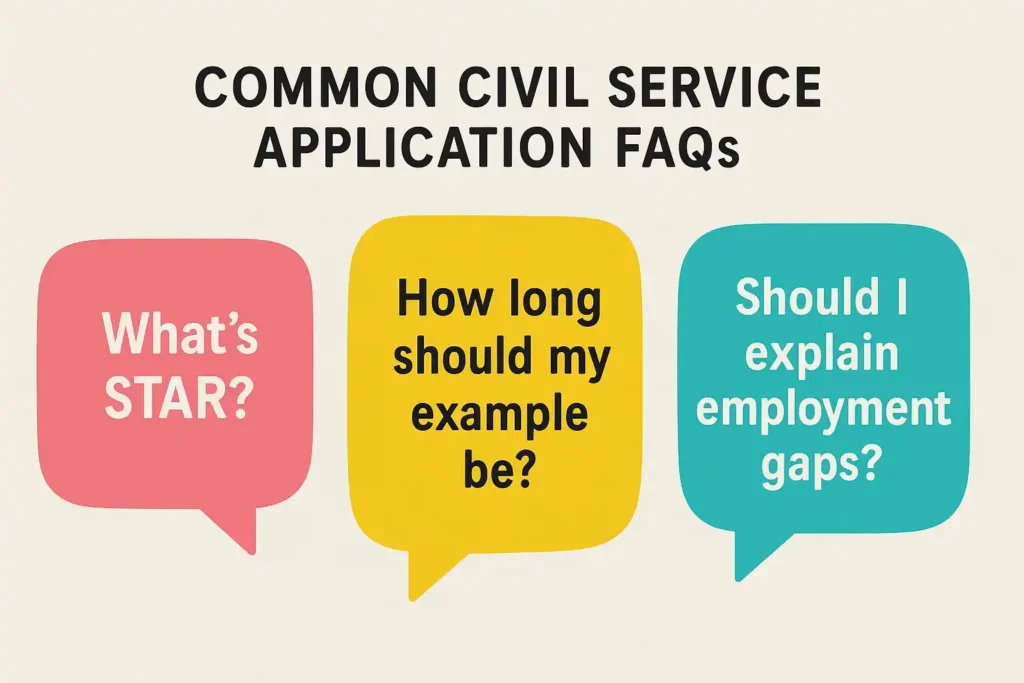
What’s the difference between Employment History and Previous Skills and Experience?
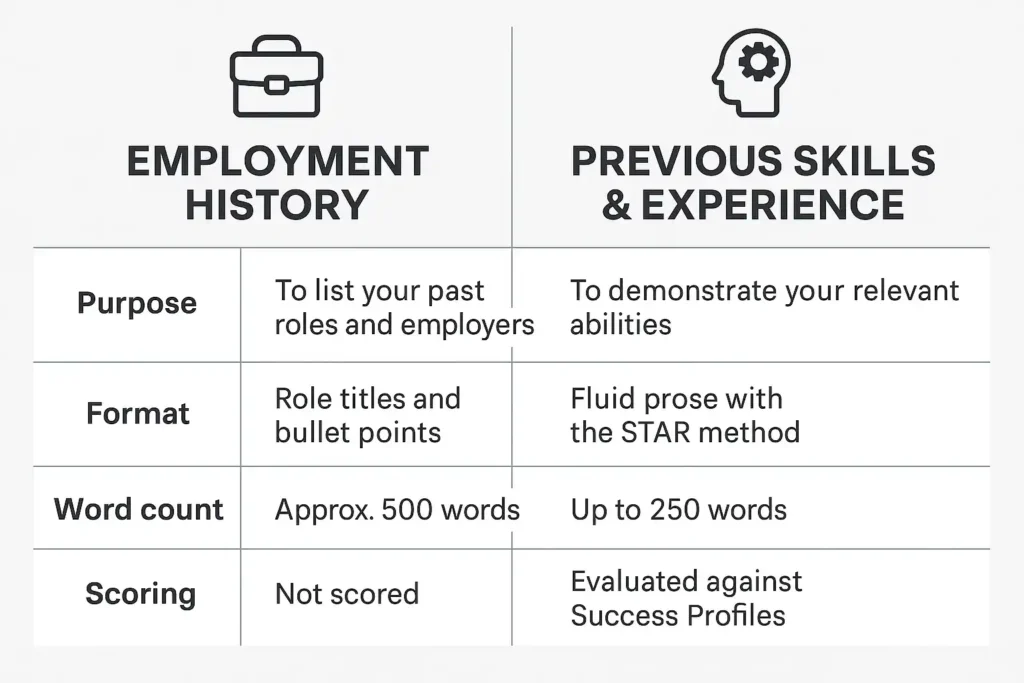
Employment History is a factual list of past roles (job titles, dates, duties). Previous Skills and Experience is a narrative example that shows how your experience aligns with the role, often written using the STAR method.
Should I use STAR format in both sections?
No. Use the STAR format only in the Previous Skills and Experience or Statement of Suitability sections. The Employment History section should be concise and factual.
How long should my ‘Previous Skills and Experience’ section be?
Most departments cap this section at 250 to 300 words. Always check the job advert for the word limit. If none is listed, keep it brief but impactful, ideally one clear STAR example.
Can I reuse examples from my CV in the form?
Yes, but rewrite and tailor them to match the wording and behaviours listed in the job advert. Avoid copy-pasting entire CV bullet points, instead, structure your response in full sentences and focus on impact.
Do I need to explain gaps in my employment history?
Yes, be honest but brief. For example, “Career break (Jan–Sept 2023) to care for family.” Recruiters appreciate transparency, especially if the rest of your application is strong.
Will someone actually read my full application form?
Yes, especially for roles that are shortlisted based on Success Profiles. Civil Service recruiters use your written examples to score behaviours like Delivering at Pace, Communicating and Influencing, and Making Effective Decisions.
✅ Civil servant job profile overview
Can I apply for multiple roles with the same application?
You should tailor each application. Even similar roles may assess different behaviours or strengths, so copying across forms without editing can hurt your chances.
Conclusion: Nail Your Civil Service Job Application with Confidence
Applying for a UK Civil Service job doesn’t need to be overwhelming. Once you understand the purpose of each section, especially the difference between Employment History and Previous Skills and Experience, you’ll be able to approach your application with clarity and confidence.
Here’s what to remember:
- Employment History is factual, roles, dates, and responsibilities
- Previous Skills and Experience is a scored section; use the STAR method
- Format matters, keep it professional, anonymised, and aligned with word limits
- Tailor every response to the Success Profiles in the job description
Whether you’re applying for your first AO-level role or aiming for an HEO or SEO post, this guide gives you the foundation to present your experience effectively and score highly during the review process.
📥 Ready to go further?
✅ Download your free Civil Service CV Template
✅ Read our expert guide to writing a Civil Service CV
✅ Book a CV Review or 1:1 support with Brendan Hope CV Writing
💡 Final Tip:
Always align your examples with the role’s Success Profiles, that’s what panels are trained to score.


Recent Comments